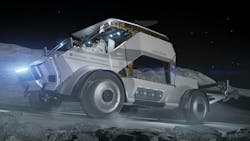NASA announces trio of companies selected to advance lunar surface vehicle
WASHINGTON - The National Aeronautics and Space Administration (NASA) announced it selected Intuitive Machines in Houston, Lunar Outpost in Golden, Colo., and Venturi Astrolab in Hawthorne, Calif. to advance capabilities for the lunar terrain vehicle (LTV) that Artemis astronauts will use to travel around the lunar surface.
NASA will acquire the LTV as a service from industry. The indefinite-delivery/indefinite-quantity, milestone-based Lunar Terrain Vehicle Services contract with firm-fixed-price task orders has a combined maximum potential value of $4.6 billion for all awards.
Each provider will begin with a feasibility task order, which will be a year-long special study to develop a system that meets NASA’s requirements through the preliminary design maturity project phase. The agency will issue a subsequent request for task order proposal to eligible providers for a demonstration mission to continue developing the LTV, deliver it to the surface of the Moon, and validate its performance and safety ahead of Artemis V. NASA anticipates making an award to only one provider for the demonstration. NASA will issue additional task orders to provide unpressurized rover capabilities for the agency’s moonwalking and scientific exploration needs through 2039.
Related: NASA seeks industry proposals for next-gen Lunar Terrain Vehicle
The LTV will be able to handle the extreme conditions at the Moon’s South Pole and will feature advanced technologies for power management, autonomous driving, and state-of-the-art communications and navigation systems. Crews will use the LTV to explore, transport scientific equipment, and collect samples of the lunar surface, much farther than they could on foot, enabling increased science returns.
Between Artemis missions, when crews are not on the Moon, the LTV will operate remotely to support NASA’s scientific objectives as needed. Outside those times, the provider will have the ability to use their LTV for commercial lunar surface activities unrelated to NASA missions.
NASA provided technical requirements, capabilities, and safety standards needed for LTV development and operations, and the selected companies have agreed to meet the key agency requirements. The contract request for proposal required each provider to propose a solution to provide end-to-end services, including LTV development, delivery to the Moon, and execution of operations on the lunar surface.
Related: NASA announces first lunar instruments for Artemis astronaut deployment
